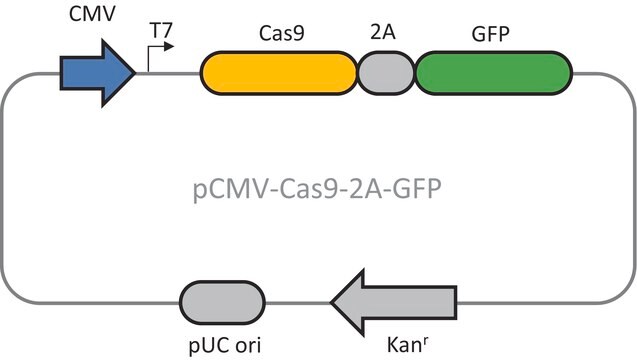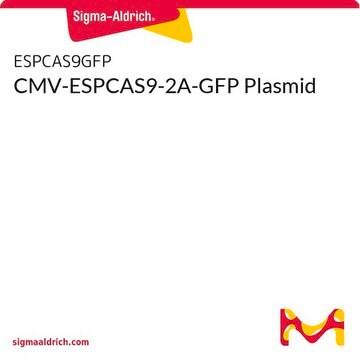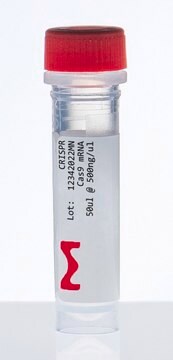ESPCAS9PRO
eSpCas9 Protein
from Streptococcus pyogenes with mutations conferring enhanced specificity, recombinant, expressed in E. coli, 1X NLS
Synonym(s):
Enhanced specificity Cas9, eCas9, eSpCas9, eSpCas9 1.1, eSpyCas9
About This Item
Recommended Products
recombinant
expressed in E. coli
Quality Level
Assay
≥95% (SDS-PAGE)
form
lyophilized powder
packaging
pkg of 1 kit (3 components)
application(s)
CRISPR
shipped in
ambient
storage temp.
−20°C
General description
Application
Features and Benefits
- Enhanced specificity compared to wild type Cas9
- Highly active
- Ready-to-inject/transfect
Packaging
pkg of 250 μg
Components
- one vial of eSpCas9 recombinant protein
- one vial containing 1 mL of 1× dilution buffer
- one vial containing 1 mL of nuclease-free water with glycerol
Principle
Reconstitution
Other Notes
Check out our other MISSION® Cas9 Proteins at SigmaAldrich.com/CRISPRproteins
Legal Information
Kit Components Only
- Enhanced specificity Cas9-NLS from Streptococcus pyogenes, expressed in Escherichia coli
- Dilution buffer for Cas9 proteins
- Reconstitution solution for Cas9 proteins
Storage Class Code
10 - Combustible liquids
Flash Point(F)
Not applicable
Flash Point(C)
Not applicable
Regulatory Listings
Regulatory Listings are mainly provided for chemical products. Only limited information can be provided here for non-chemical products. No entry means none of the components are listed. It is the user’s obligation to ensure the safe and legal use of the product.
PDSCL
Please refer to KIT Component information
PRTR
Please refer to KIT Component information
FSL
Please refer to KIT Component information
ISHL Indicated Name
Please refer to KIT Component information
ISHL Notified Names
Please refer to KIT Component information
Cartagena Act
Please refer to KIT Component information
JAN Code
キットコンポーネントの情報を参照してください
Certificates of Analysis (COA)
Search for Certificates of Analysis (COA) by entering the products Lot/Batch Number. Lot and Batch Numbers can be found on a product’s label following the words ‘Lot’ or ‘Batch’.
Already Own This Product?
Find documentation for the products that you have recently purchased in the Document Library.
Customers Also Viewed
Articles
Validate CRISPR gene editing experiments easily with Sigma-Aldrich® T7E1 mismatch detection kit, ensuring successful editing.
Protocols
Combine guaranteed sgRNAs with our comprehensive range of CRISPR products and tools, including Cas9 and delivery reagents, for efficient genome modification with higher specificity.
Our team of scientists has experience in all areas of research including Life Science, Material Science, Chemical Synthesis, Chromatography, Analytical and many others.
Contact Technical Service














